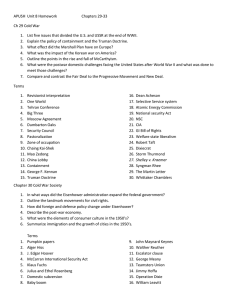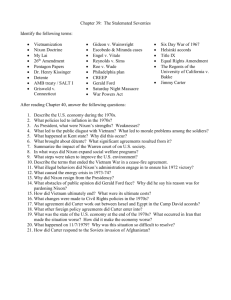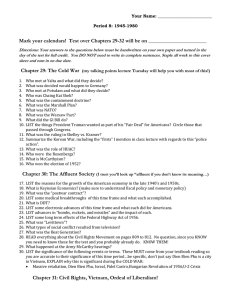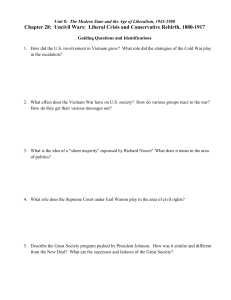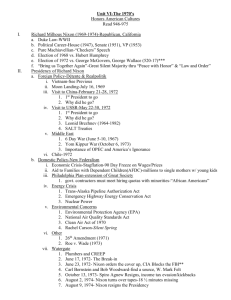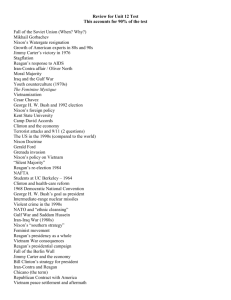Chapter 35: Rebellion and Reaction in the 1960s and 1970s
advertisement
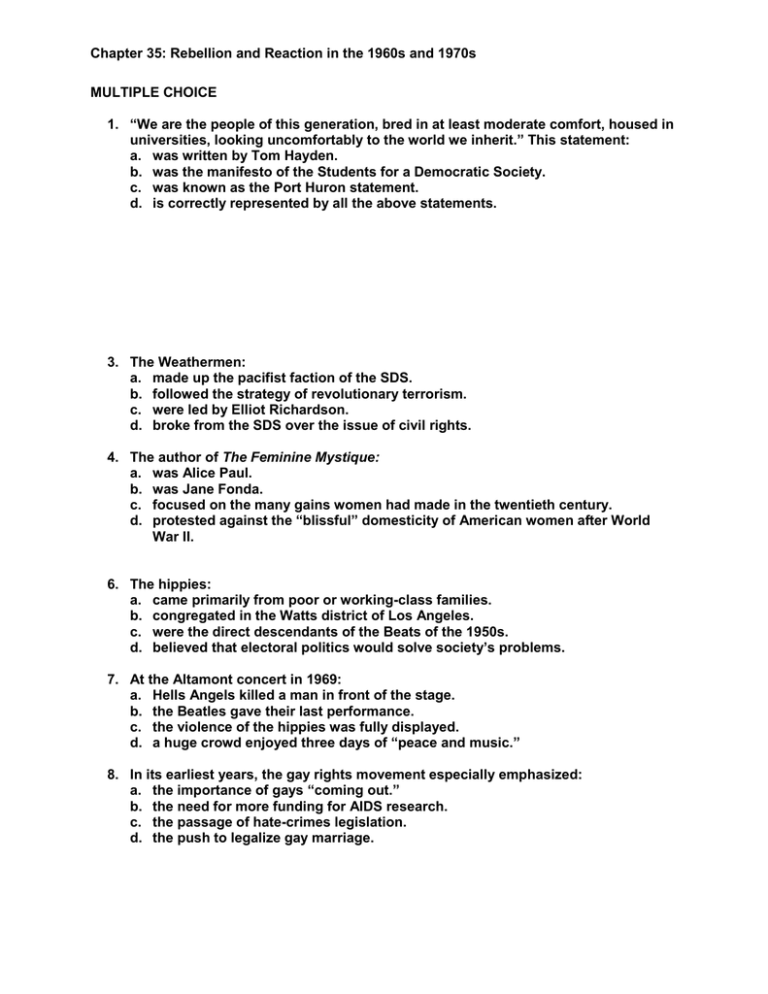
Chapter 35: Rebellion and Reaction in the 1960s and 1970s MULTIPLE CHOICE 1. “We are the people of this generation, bred in at least moderate comfort, housed in universities, looking uncomfortably to the world we inherit.” This statement: a. was written by Tom Hayden. b. was the manifesto of the Students for a Democratic Society. c. was known as the Port Huron statement. d. is correctly represented by all the above statements. 3. The Weathermen: a. made up the pacifist faction of the SDS. b. followed the strategy of revolutionary terrorism. c. were led by Elliot Richardson. d. broke from the SDS over the issue of civil rights. 4. The author of The Feminine Mystique: a. was Alice Paul. b. was Jane Fonda. c. focused on the many gains women had made in the twentieth century. d. protested against the “blissful” domesticity of American women after World War II. 6. The hippies: a. came primarily from poor or working-class families. b. congregated in the Watts district of Los Angeles. c. were the direct descendants of the Beats of the 1950s. d. believed that electoral politics would solve society’s problems. 7. At the Altamont concert in 1969: a. Hells Angels killed a man in front of the stage. b. the Beatles gave their last performance. c. the violence of the hippies was fully displayed. d. a huge crowd enjoyed three days of “peace and music.” 8. In its earliest years, the gay rights movement especially emphasized: a. the importance of gays “coming out.” b. the need for more funding for AIDS research. c. the passage of hate-crimes legislation. d. the push to legalize gay marriage. 9. The United Farm Workers: a. was especially concerned with black tenant farmers in the South. b. was especially concerned with Hispanic migrant workers. c. led a national boycott of beef. d. sponsored a national campaign to increase beef consumption. 12. Nixon’s Vietnam policy included all the following except: a. demands at the Paris peace talks for the withdrawal of Communist forces from South Vietnam. b. continued buildup of American armed forces in Vietnam. c. reduction of domestic unrest over the war. d. expansion of the air war in Vietnam. 13. In 1972, the Christmas bombings and the mining of North Vietnamese harbors: a. aroused worldwide protest. b. set the U.S. military back five years. c. brought an end to communist rule in North Vietnam. d. were cheered worldwide. 14. The figure who most influenced Nixon’s foreign policy was: a. General Alexander Haig. b. Robert McNamara. c. Henry Kissinger. d. William Rogers. 15. Nixon’s new relationship with China was made possible by: a. the discovery of China’s vast oil deposits. b. China’s growing fear of the Soviet Union. c. Nixon’s landslide reelection in 1972. d. a more favorable attitude of the American public toward Communism. 16. The student demonstrations at Kent State University that resulted in the deaths of four students were a response to: a. news of the My Lai massacre. b. passage of the Gulf of Tonkin resolution. c. Nixon’s announcement of his planned “Vietnamization” of the war. d. the “incursion” into Cambodia. 17. The so-called Pentagon Papers: a. were published in defiance of a Supreme Court decision prohibiting such publication. b. quieted many critics of the Vietnam War. c. broke the story of the My Lai massacre. d. revealed that Congress and the American people had not been told the full story of the Gulf of Tonkin incident. 18. When the United States signed an agreement ending the war in Vietnam: a. the North Vietnamese kept regular army troops in South Vietnam. b. the war-torn country of Vietnam was reunited. c. South Vietnam agreed to a Communist government. d. peace came to the region for almost a dozen years, until the Communist takeover in Cambodia. 20. The Twenty-sixth Amendment: a. prohibited the president from sending troops out of the country for more than sixty days without the consent of Congress. b. set in motion the affirmative action program. c. gave eighteen-year-olds the right to vote. d. repealed the Twentieth Amendment. 21. The economic malaise during the Nixon administration was caused by all the following except: a. a rapid contraction of the money supply. b. increased government spending through the 1960s without a major tax increase. c. the stiff competition American goods faced on the international market. d. the oil shortage. 22. Nixon’s triumph concerning China was: a. American diplomatic recognition of the People’s Republic of China. b. American diplomatic recognition of Taiwan. c. the successful conclusion of negotiations for nuclear arms reduction. d. the signing of a mutual defense treaty. 23. The SALT agreement: a. ended the arms race. b. greatly limited the development of new weapons systems. c. set limits on certain types of nuclear weapons. d. prohibited either side from producing or possessing intercontinental ballistics missiles. 24. In the presidential election of 1972: a. Nixon won by the largest majority ever for a Republican candidate. b. the Democrats won only the states of the Deep South and New England. c. George Wallace won ten electoral votes as the nominee of the American Independent party. d. All the above statements are true. 25. Nixon’s Watergate-related downfall came with the revelation that he had: a. burned his tapes of White House conservations. b. lied to the Senate’s Ervin Committee c. authorized the burglary of the Democratic party’s headquarters. d. ordered a cover-up of the original Watergate break-in. 27. In foreign policy, President Ford: a. was led mainly by Dean Rusk. b. laid the foundation for SALT II. c. negotiated the Camp David agreements. d. called for an international trade embargo of Iran. 28. Jimmy Carter: a. was governor of Virginia. b. was only the second Catholic to be elected president. c. was a peanut farmer and former naval officer. d. is correctly represented by all the above statements. 29. In the presidential election of 1976: a. Jimmy Carter won most of the black vote in the South. b. Jimmy Carter beat Ronald Reagan by a small margin. c. Ronald Reagan won every southern state except Virginia. d. voter turnout was over 60 percent, reflecting a greatly increased political awareness following the Watergate affair. 31. Once in office, Richard Nixon: a. appointed the first black members to his cabinet. b. met with the Congressional Black Caucus on a monthly basis. c. appointed no African Americans to his cabinet. d. actively sought to enforce civil rights laws. 32. President Carter said American foreign policy should be based on: a. anti-communism. b. maintaining American superiority around the world. c. economic self-interest. d. the defense of human rights. 34. When President Carter sent American commandos to rescue the hostages held in Iran: a. Henry Kissinger resigned as secretary of state. b. helicopter failures forced them to abort the mission. c. the shah of Iran threatened to kill the hostages if there was another such mission. d. All the above are true.
